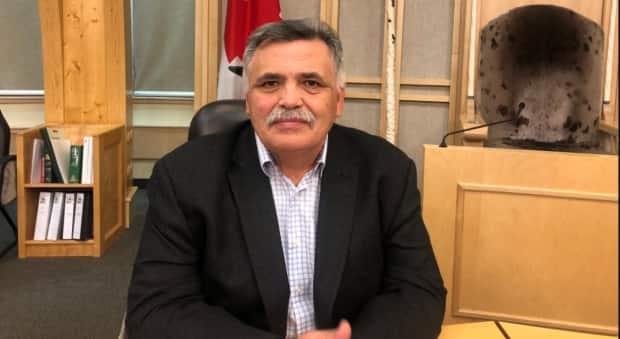Nunavut officials scold Iqalummiut as parties continue to spread COVID-19

Nunavut officials used their opening statements at Friday's COVID-19 news conference to heavily scold Iqaluit residents for not following public health rules.
Unsafe gatherings have continued to spread COVID-19 throughout this week, Chief Public Health Officer Dr. Michael Patterson said. Those gatherings include parties, playing outside without masks, and visiting other households inside.
A gathering of multiple households caused three full households to be isolated. Gatherings are by far the largest cause of the virus's spread in Nunavut, according to Patterson.
A Mother's Day gathering brought together three or four households, who are now isolated. Public health has also noted spread through unmasked outdoor gatherings.
Partiers then spread COVID-19 to other members of their household, some of whom may not even have known there was a party.
"As of [Friday] morning, there are 264 people in isolation in Iqaluit. The more people that must isolate due to exposure to COVID-19 the greater the risk that essential services will be impacted," Patterson said.
Twelve new cases were announced in Iqaluit on Friday, along with 8 recoveries, which brings Nunavut's total active cases to 78.
Health Minister Lorne Kusugak asked everyone to follow the rules, so all Nunavummiut can enjoy the territory's short summer.
"If people want to go to your house for a party, tell them to go away, come back in a couple weeks, stay away from going to parties yourselves ...This is pretty simple stuff, it has to stop." Kusugak said.
Minister of Justice George Hickes said when the outbreak hit Iqaluit, emergency dispatch was faced with a large volume of calls and short staff as some RCMP officers were in isolation.
Since the beginning of lockdown the various agencies involved in enforcement have sorted out how to triage those calls, Hickes said.
If it makes sense, calls about parties will go to the RCMP, whereas it's easier for bylaw or the sheriff's office to take on reports of a single person not adhering to the rules.
Missed Friday's news conference? Watch it here:
Patterson also used his opening statement at Friday's news conference to ask Iqalummiut to cooperate with surveillance testing that is ongoing in the city. He said many people refused swabs because they are afraid of being isolated.
Even among workplaces with potential exposure or larger consequences if COVID-19 is discovered, Patterson said isolation will only be necessary if someone tests positive for the virus.
"If you are asymptomatic and positive for COVID-19 you may be spreading the virus, if you have COVID and do not isolate you are putting other people at risk," he said.
Most people in Iqaluit who are tested are still having public health staff come to their home for a swab. Those identified for surveillance testing — for example part of a high risk workplace — can make an appointment for the screening clinic at Cadet Hall.
When could lockdown end?
Declaring the outbreak over in Iqaluit will only happen 28 days after the last case recovers, but there are ways to ease measures before then, Patterson said.
In the past, the government's threshold for easing restrictions was when there was no further spread of the virus to new households.
Patterson said he didn't know if that threshold still made sense as more people get vaccinated, saying vaccination rates can change what measures are appropriate.
Health care workers promote the vaccine at people's regular health care appointments if the shot makes sense for those patients, he said.
"Individuals who live in poverty, in overcrowded housing, and have issues with food insecurity are more likely to get COVID-19 and more likely to have severe infections," Patterson said.
Before Patterson would consider allowing single people to bubble with another household, he said he'd like to see a significant reduction in the number of new houses being identified for isolation.
Any easing of restrictions he says can send mixed messages and increase risk. Even without easing, Patterson says people interpret a day with fewer cases as a spur to return to normal activities.
"When the numbers are looking good for a couple days and people say things like 'oh we've turned a corner' and then frequency of gatherings and the number of unsafe gatherings increase within a day or two and the end result is we see more cases," Patterson said.
Speaking as the Minister of Finance, George Hickes said both the airlines and hotel hub contracts are in place until the end of June, but it was too early to say for how long those contracts will be extended beyond June.
The Nunavut government said this week it is working to get the Pfizer-BioNTech vaccine to the territory. It is set to be offered to youth aged 12 and older, however there is no timeline yet for when that will happen.
The Pfizer vaccine will be administered in communities experiencing an outbreak or which are at higher risk of spread, which Patterson said means Iqaluit will likely be the first community to have access to it.

